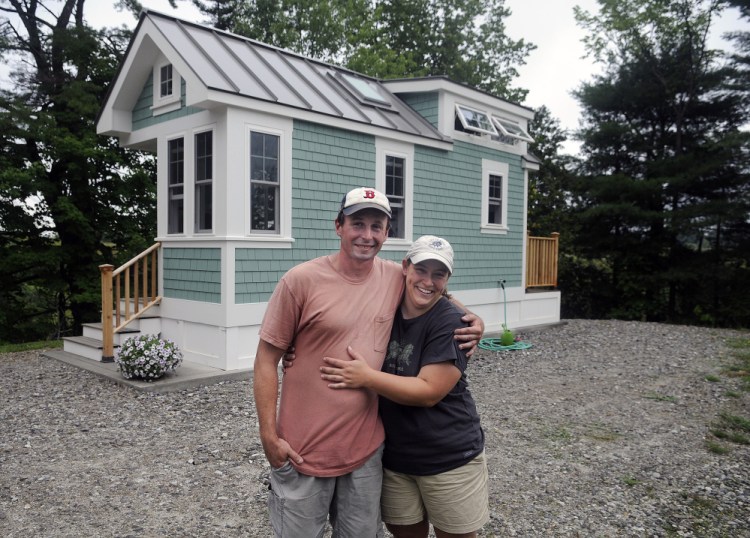RICHMOND — When James Valley signed off on the tiny house on Route 197 in Richmond a little more than a year ago, Richmond’s code enforcement officer considered it similar to a mobile home.
“It was my thought that it had been inspected, like a modular home or a mobile home,” Valley said.
But the tiny house, built by Luke Lucier in Cape Elizabeth and moved to Richmond, was not inspected, and that was a problem for the small town in northern Sagadahoc County.
Richmond drew the line on tiny houses at that one.
Tiny houses, celebrated as a lifestyle choice on a number of cable television networks with shows like “Tiny House Nation,” and “Tiny House Builders,” pose a number of problems for cities and towns across Maine that observe building codes.
Later this month, some of those problems could be resolved.
The Maine Technical Building Codes and Standards Board has scheduled a public hearing on proposed changes to Maine’s building codes, including adopting guidelines for tiny houses for the first time.
Generally speaking, a tiny house is a structure that’s between 100 and 400 square feet. Those compact areas feature living and sleeping spaces as well as a kitchen and a bathroom. Because of its size, a tiny house often costs a fraction of what a traditional house costs, although in either case, the choice of materials can affect price greatly.
Rep. Seth Berry, D-Bowdoinham, said he met some people at Long Branch Tiny Homes in Bowdoinham, who wanted to show him what they were and talk about some commonly held concerns about the small structures.
“Many of them could be addressed if Maine were to adopt some newly proposed appendices for tiny homes,” Berry said.
When the Maine Legislature met, Berry sponsored a bill to adopt tiny house standards in the Maine Uniform Building and Energy Code. But he eventually withdrew the bill, opting instead to ask state regulators to use rule-making powers instead.
That route would be faster and more effective, he said.
“(The uniform code) applies to communities of 4,000 or more people,” Berry said, and often smaller communities adopt those standards as well.
In the code are provisions regulating ceiling height, stair dimensions and what’s acceptable for an emergency exit.
Because of their small envelope, tiny houses are designed using ladders to reach sleeping lofts, which may have roof windows or skylights for light and ventilation.
The appendix that’s proposed would create tiny-house specific regulations covering those areas.
Alan Plummer, the Maine chapter representative of American Tiny House Association, said what’s proposed will clear a number of hurdles for people interested in building tiny houses in Maine.
If the regulations are adopted, he said, that won’t just allow tiny houses throughout Maine, it will also allow communities to adopt their own requirements that are more strict than what the state allows.
“Each town is very different,” Plummer said. “What this is going to do is give people a reference point on how to build their house.”
While they are tiny, these houses still must meet state building codes, he said, and that would include regulations specific to this kind of house.
“A lot of communities just say no, and that’s a problem for tiny house people,” Plummer said, because current provisions in the statewide building code preclude building a tiny dwelling.
While the appendix could solve some problems, it won’t clear up every conceivable problem, Plummer said.
Some communities don’t want tiny houses if they are on trailers, as many of them are.
In March, the city of Portland sued a man who placed two tiny houses on a lot so he could rent them out over city ordinance and code violations.
City officials wanted the court to order Brent Adler to remove the homes from his Chapel Street lot. In May, Adler agreed to remove the tiny homes and pay $1,000 for placing the tiny homes on the lot and for not having the necessary permits.
Under the settlement, Adler admitted no violation and agreed to move the homes.
Adler had maintained that he didn’t permits for the homes because they are recreational vehicles with a motor vehicle registration and the city had no requirements about RV parks. The city’s position was that RV parks are not addressed in city code and are therefore prohibited.
Plummer said issues would be addressed one bit at a time.
Even if the appendix passes, Richmond officials will still have a concern about inspections.
Valley said in the normal course of home construction, a number of inspections are scheduled throughout the process. One of them is for framing.
If a tiny house is built elsewhere and brought to Richmond, he wouldn’t accept it because he would have no information about the inspection.
“If it’s built here on-site, that’s not a problem,” he said.
The Maine Building Codes and Standards Board will hold its public hearing at 9 a.m. Sept. 18 in the Champlain Conference Room at Department of Public Safety building at 45 Commerce Drive. The board is accepting public comment through Sept. 28.
Jessica Lowell — 621-5632
Twitter: @JLowellKJ
Send questions/comments to the editors.



Success. Please wait for the page to reload. If the page does not reload within 5 seconds, please refresh the page.
Enter your email and password to access comments.
Hi, to comment on stories you must . This profile is in addition to your subscription and website login.
Already have a commenting profile? .
Invalid username/password.
Please check your email to confirm and complete your registration.
Only subscribers are eligible to post comments. Please subscribe or login first for digital access. Here’s why.
Use the form below to reset your password. When you've submitted your account email, we will send an email with a reset code.